英语中主动表被动的六种常见结构
英语中动词主动表被动用法归纳
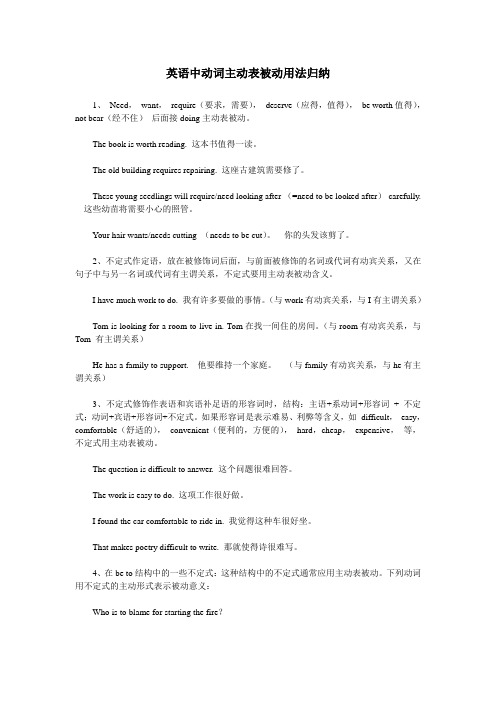
1、Need,want,require(要求,需要),deserve(应得,值得),be worth值得),not bear(经不住)后面接doing主动表被动。
The book is worth reading.这本书值得一读。
The old building requires repairing.这座古建筑需要修了。
He has a family to support.他要维持一个家庭。 (与family有动宾关系,与he有主谓关系)
3、不定式修饰作表语和宾语补足语的形容词时,结构:主语+系动词+形容词+不定式;动词+宾语+形容词+不定式。如果形容词是表示难易、利弊等含义,如difficult,easy,comfortable(舒适的),convenient(便利的,方便的),hard,cheap,expensive,等,不定式用主动表被动。
Much is to do.太多要做的事。
9、在“there be”句型中作主语的定语如果现在分词时,所用的现在分词要用主动表被动意义。
There is nothing doing these days.这些天没事干。
I see there’s a good idea planning.我知道又在打好主意。
2、不定式作定语,放在被修饰词后面,与前面被修饰的名词或代词有动宾关系,又在句子中与另一名词或代词有主谓关系,不定式要用主动表被动含义。
I have much work to do.我有许多要做的事情。(与work有动宾关系,与I有主谓关系)
Tom is looking for a room to live in. Tom在找一间住的房间。(与room有动宾关系,与Tom有主谓关系)
英语主动表被动用法归纳
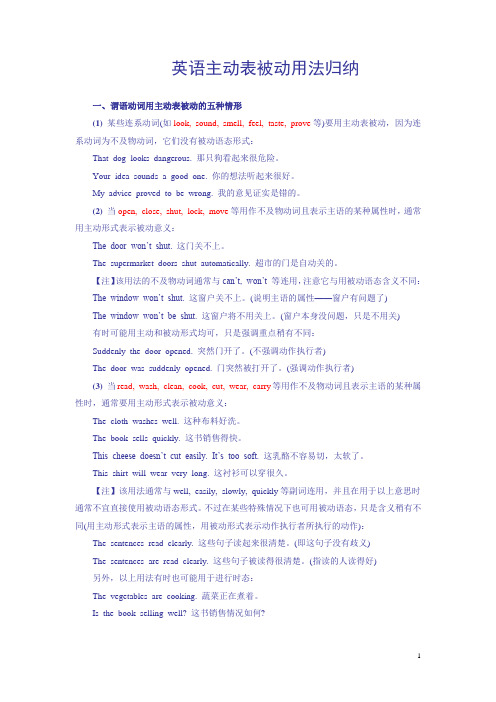
英语主动表被动用法归纳一、谓语动词用主动表被动的五种情形(1)某些连系动词(如look, sound, smell, feel, taste, prove等)要用主动表被动,因为连系动词为不及物动词,它们没有被动语态形式:That dog looks dangerous. 那只狗看起来很危险。
Your idea sounds a good one. 你的想法听起来很好。
My advice proved to be wrong. 我的意见证实是错的。
(2)当open, close, shut, lock, move等用作不及物动词且表示主语的某种属性时,通常用主动形式表示被动意义:The door won’t shut. 这门关不上。
The supermarket doors shut automatically. 超市的门是自动关的。
【注】该用法的不及物动词通常与can’t, won’t 等连用,注意它与用被动语态含义不同:The window won’t shut. 这窗户关不上。
(说明主语的属性——窗户有问题了)The window won’t be shut. 这窗户将不用关上。
(窗户本身没问题,只是不用关)有时可能用主动和被动形式均可,只是强调重点稍有不同:Suddenly the door opened. 突然门开了。
(不强调动作执行者)The door was suddenly opened. 门突然被打开了。
(强调动作执行者)(3)当read, wash, clean, cook, cut, wear, carry等用作不及物动词且表示主语的某种属性时,通常要用主动形式表示被动意义:The cloth washes well. 这种布料好洗。
The book sells quickly. 这书销售得快。
This cheese doesn’t cut easily. It’s too soft. 这乳酪不容易切,太软了。
英语主动表被动用法归纳

英语主动表被动用法归纳
英语中的被动语态是表达动作的接收者的一种语法结构,而不是动作的执行者。
然而,有时我们也会使用主动语态来表示被动意义,这就是主动表被动用法。
以下是一些常见的主动表被动用法的归纳:
1. "动词+ oneself" 结构:这种结构表示主语自己对自己进行某个动作,有自我参考的意味。
例如:He hurt himself while playing soccer.
2. "动词+ each other" 结构:这种结构表示两个或多个主语互相进行某个动作。
例如:They helped each other with their homework.
3. "动词+ something" 结构:这种结构表示主语对某个物体进行某个动作。
例如:She painted the wall white.
4. "be + 动词过去分词" 结构:这种结构表示主语的状态或特征。
例如:The window was broken by the ball.
5. "get + 动词过去分词" 结构:这种结构表示主语经历了某种变化或受到某种影响。
例如:She got lost in the city.
6. "become + 动词过去分词" 结构:这种结构表示主语变成了某种状态或特征。
例如:The water became ice.
以上是一些常见的主动表被动用法。
1。
高中英语语法主动表被动

1.表示被动含义的主动动词1)系动词没有被动形式,但有些系动词常表示被动意义。
常见的有taste(吃起来), sound (听起来), prove(证明是), feel(摸上去感到)等,例如:Your reason sounds reasonable.你的理由听起来很合理。
Good medicine tastes bitter to the mouth.良药苦口。
2)一些与can't(不能)或won't(不会)连用的动词。
常用的有: lock(锁住), shut(关上) , open(打开), act(上演)等,例如:The door won't open.这门打不开。
It can't move.它不能动。
3)一些与well(很), easily(容易地), perfectly(十分地)等连用的动词,如: sell(销售) , wash(洗), clean(打扫), burn(燃烧), cook(煮)等,例如:The book sells well.这种书很畅销。
These clothes wash well.这些衣服很耐洗。
4)用在“主语+不及物动词+主语补语”句型中的一些不及物动词,例如:This material has worn thin.这料子已磨薄了。
The dust has blownsintosthe house.灰尘被风吹进了房子。
2.表示被动含义的主动结构1)动名词be worth(值得), want (=need)(需要), need(需要), require(需要)后所用的动名词,必须用主动结构表示被动意义,例如:These young seedlings will require/need looking after (=need to be looked after) carefully.这些幼苗将需要小心的照管。
Your hair wants/needs cutting (needs to be cut).你的头发该剪了。
英语中主动表被动现象归纳总结
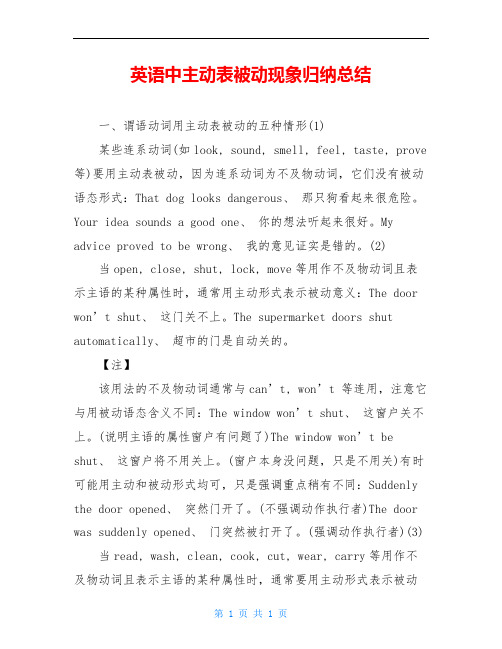
英语中主动表被动现象归纳总结一、谓语动词用主动表被动的五种情形(1)某些连系动词(如look, sound, smell, feel, taste, prove 等)要用主动表被动,因为连系动词为不及物动词,它们没有被动语态形式:That dog looks dangerous、那只狗看起来很危险。
Your idea sounds a good one、你的想法听起来很好。
My advice proved to be wrong、我的意见证实是错的。
(2) 当open, close, shut, lock, move等用作不及物动词且表示主语的某种属性时,通常用主动形式表示被动意义:The door won’t shut、这门关不上。
The supermarket doors shut automatically、超市的门是自动关的。
【注】该用法的不及物动词通常与can’t, won’t 等连用,注意它与用被动语态含义不同:The window won’t shut、这窗户关不上。
(说明主语的属性窗户有问题了)The window won’t be shut、这窗户将不用关上。
(窗户本身没问题,只是不用关)有时可能用主动和被动形式均可,只是强调重点稍有不同:Suddenly the door opened、突然门开了。
(不强调动作执行者)The door was suddenly opened、门突然被打开了。
(强调动作执行者)(3) 当read, wash, clean, cook, cut, wear, carry等用作不及物动词且表示主语的某种属性时,通常要用主动形式表示被动意义:The cloth washes well、这种布料好洗。
The book sells quickly、这书销售得快。
This cheese doesn’t cut easily、It’s too soft、这乳酪不容易切,太软了。
英语主动形式表被动意义的几种情况
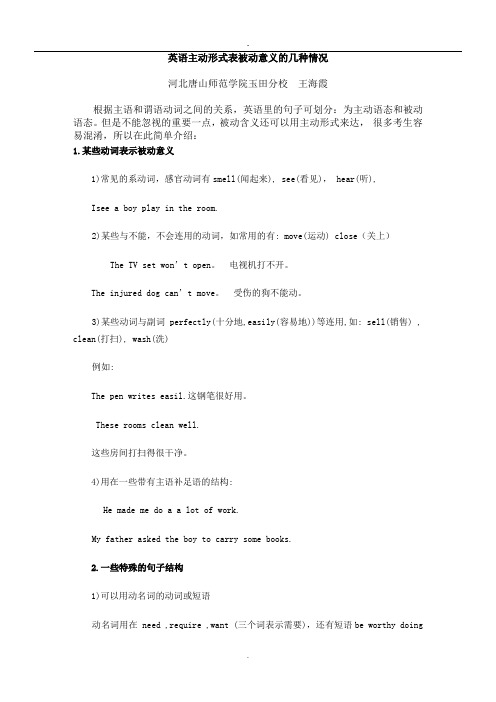
英语主动形式表被动意义的几种情况河北唐山师范学院玉田分校王海霞根据主语和谓语动词之间的关系,英语里的句子可划分:为主动语态和被动语态。
但是不能忽视的重要一点,被动含义还可以用主动形式来达,很多考生容易混淆,所以在此简单介绍:1.某些动词表示被动意义1)常见的系动词,感官动词有smell(闻起来), see(看见), hear(听),Isee a boy play in the room.2)某些与不能,不会连用的动词,如常用的有: move(运动) close(关上)The TV set won’t open。
电视机打不开。
The injured dog can’t move。
受伤的狗不能动。
3)某些动词与副词 perfectly(十分地,easily(容易地))等连用,如: sell(销售) , clean(打扫), wash(洗)例如:The pen writes easil.这钢笔很好用。
These rooms clean well.这些房间打扫得很干净。
4)用在一些带有主语补足语的结构:He made me do a a lot of work.My father asked the boy to carry some books.2.一些特殊的句子结构1)可以用动名词的动词或短语动名词用在 need ,require ,want (三个词表示需要),还有短语be worthy doing例如:The passage requires cancling.The meeting is worth attending.2)在不定式短语中不定式在句子中做动词的宾语时候,表示宾语是动词的承受对象例如:I have a lot of work to do。
He passed his mother some juice to drink.但是有的时候主动形式还有被动形式表示的含义差别不大:There is a lot of words to express /to be expressed.很多的话需要表达。
主动形式表被动的几种情况

主动形式表被动的几种情况在英语教学中,有一些单词形式上是主动形式,实际上却是表达被动的意思。
而在实际的教学中,常见的有以下单词:一、某些表示状态特征的系动词:如:sound, seem,smell, taste, look, feel,有时用主动形式表被动意义。
The music sounds wonderful. 这首音乐听起来很优美。
The flowers smell sweet。
这些花闻起来很香甜。
The apples taste delicious. 这些苹果尝起来非常美味可口。
二、某些表主语内在品质或性能的动词:如:lock, sell,wash,read, write,open,wear,keep 其主动形式表被动意义。
The door won’t lock. 门没有锁上。
These books sell well. 这些书很畅销。
Does the cloth washes well?这种布经洗吗?三、作表语用的一些形容词:如:easy,difficult, hard, nice, possible, impossible 等后面作状语的不定式,其主动形式表被动意义。
I think English is easy to learn。
我认为英语很容易学.The physics problem is not difficult to work out。
这些物理问题不好解决.四、不定式作定语,又与所修饰的名词或代词存在逻辑上的动宾关系,此时的主动形式表被动的意义。
I have a lot of work to do today。
今天我有很多事情要做.He has some questions to ask。
他有一些问题要问.Would you like something to drink?你要点东西喝吗?五、“too。
.。
to”结构中的不定式的主动形式表被动的意义。
The box is too heavy to carry。
英语中主动表被动的情况
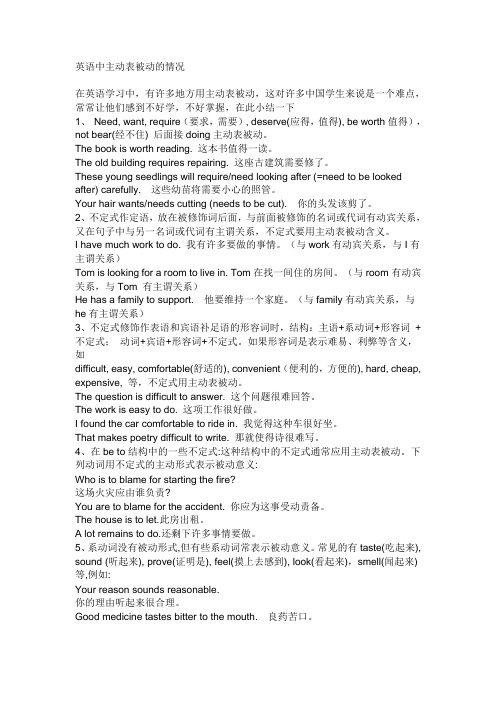
英语中主动表被动的情况在英语学习中,有许多地方用主动表被动,这对许多中国学生来说是一个难点,常常让他们感到不好学,不好掌握,在此小结一下1、Need, want, require(要求,需要), deserve(应得,值得), be worth值得),not bear(经不住) 后面接doing主动表被动。
The book is worth reading. 这本书值得一读。
The old building requires repairing. 这座古建筑需要修了。
These young seedlings will require/need looking after (=need to be looked这些幼苗将需要小心的照管。
你的头发该剪了。
2、不定式作定语,放在被修饰词后面,与前面被修饰的名词或代词有动宾关系,又在句子中与另一名词或代词有主谓关系,不定式要用主动表被动含义。
I have much work to do. 我有许多要做的事情。
(与work有动宾关系,与I有主谓关系)Tom is looking for a room to live in. Tom在找一间住的房间。
(与room有动宾关系,与Tom 有主谓关系)他要维持一个家庭。
(与family有动宾关系,与he有主谓关系)3、不定式修饰作表语和宾语补足语的形容词时,结构:主语+系动词+形容词+ 不定式;动词+宾语+形容词+不定式。
如果形容词是表示难易、利弊等含义,如difficult, easy, comfortable(舒适的), convenient(便利的,方便的), hard, cheap, expensive, 等,不定式用主动表被动。
The question is difficult to answer. 这个问题很难回答。
The work is easy to do. 这项工作很好做。
I found the car comfortable to ride in. 我觉得这种车很好坐。
高中英语主动表被动的情况总结(值得收藏)

高中英语主动表被动的情况总结(值得收藏)一、谓语动词用主动表被动的五种情形(1) 某些连系动词(如look, sound, smell, feel, taste, prove等)要用主动表被动,因为连系动词为不及物动词,它们没有被动语态形式:That dog looks dangerous. 那只狗看起来很危险。
Your idea sounds a good one. 你的想法听起来很好。
My advice proved to be wrong. 我的意见证实是错的。
(2) 当open, close, shut, lock, move等用作不及物动词且表示主语的某种属性时,通常用主动形式表示被动意义:The door won’t shut. 这门关不上。
The supermarket doors shut automatically. 超市的门是自动关的。
【注】该用法的不及物动词通常与can’t, won’t 等连用,注意它与用被动语态含义不同:T he window won’t shut. 这窗户关不上。
(说明主语的属性——窗户有问题了)The window won’t be shut. 这窗户将不用关上。
(窗户本身没问题,只是不用关)有时可能用主动和被动形式均可,只是强调重点稍有不同:Suddenly the door opened. 突然门开了。
(不强调动作执行者) The door was suddenly opened. 门突然被打开了。
(强调动作执行者)(3) 当read, wash, clean, cook, cut, wear, carry等用作不及物动词且表示主语的某种属性时,通常要用主动形式表示被动意义:The cloth washes well. 这种布料好洗。
The book sells quickly. 这书销售得快。
This cheese doesn’t cut easily. It’s too soft. 这乳酪不容易切,太软了。
(完整版)英语主动表被动用法归纳
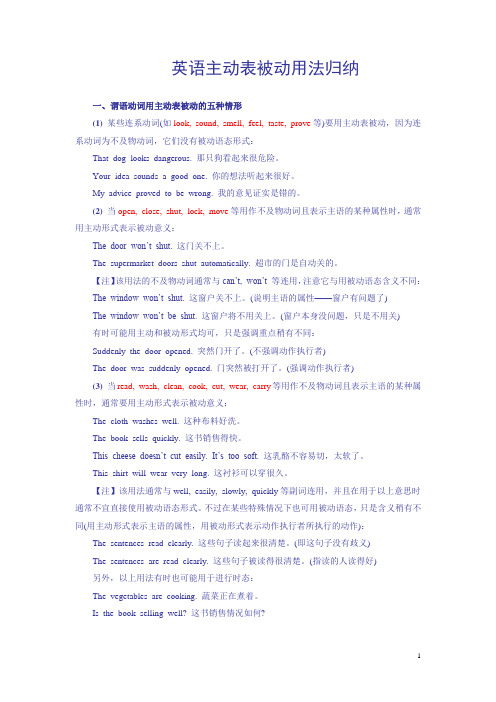
英语主动表被动用法归纳一、谓语动词用主动表被动的五种情形(1)某些连系动词(如look, sound, smell, feel, taste, prove等)要用主动表被动,因为连系动词为不及物动词,它们没有被动语态形式:That dog looks dangerous. 那只狗看起来很危险。
Your idea sounds a good one. 你的想法听起来很好。
My advice proved to be wrong. 我的意见证实是错的。
(2)当open, close, shut, lock, move等用作不及物动词且表示主语的某种属性时,通常用主动形式表示被动意义:The door won’t shut. 这门关不上。
The supermarket doors shut automatically. 超市的门是自动关的。
【注】该用法的不及物动词通常与can’t, won’t 等连用,注意它与用被动语态含义不同:The window won’t shut. 这窗户关不上。
(说明主语的属性——窗户有问题了)The window won’t be shut. 这窗户将不用关上。
(窗户本身没问题,只是不用关)有时可能用主动和被动形式均可,只是强调重点稍有不同:Suddenly the door opened. 突然门开了。
(不强调动作执行者)The door was suddenly opened. 门突然被打开了。
(强调动作执行者)(3)当read, wash, clean, cook, cut, wear, carry等用作不及物动词且表示主语的某种属性时,通常要用主动形式表示被动意义:The cloth washes well. 这种布料好洗。
The book sells quickly. 这书销售得快。
This cheese doesn’t cut easily. It’s too soft. 这乳酪不容易切,太软了。
英语中主动表被动的情况
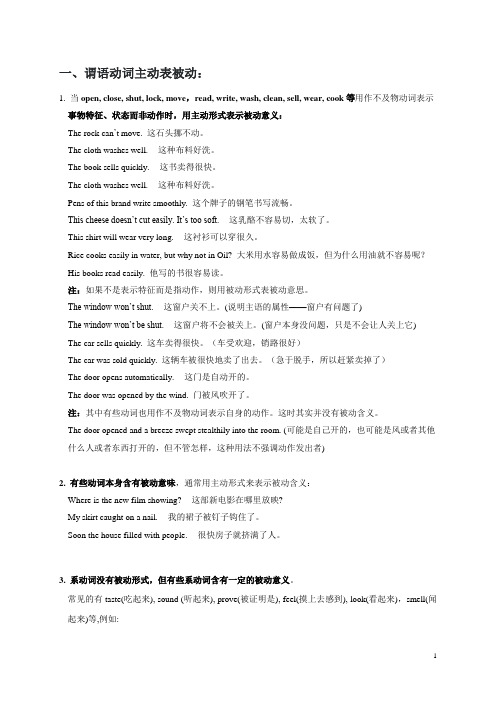
一、谓语动词主动表被动:1. 当open, close, shut, lock, move,read, write, wash, clean, sell, wear, cook等用作不及物动词表示事物特征、状态而非动作时,用主动形式表示被动意义:The rock can’t move. 这石头挪不动。
The cloth washes well.这种布料好洗。
The book sells quickly.这书卖得很快。
The cloth washes well.这种布料好洗。
Pens of this brand write smoothly. 这个牌子的钢笔书写流畅。
This cheese doesn’t cut easily. It’s too soft.这乳酪不容易切,太软了。
This shirt will wear very long.这衬衫可以穿很久。
Rice cooks easily in water, but why not in Oil? 大米用水容易做成饭,但为什么用油就不容易呢?His books read easily. 他写的书很容易读。
注:如果不是表示特征而是指动作,则用被动形式表被动意思。
The window won’t shut.这窗户关不上。
(说明主语的属性——窗户有问题了)The window won’t be shut.这窗户将不会被关上。
(窗户本身没问题,只是不会让人关上它) The car sells quickly. 这车卖得很快。
(车受欢迎,销路很好)The car was sold quickly. 这辆车被很快地卖了出去。
(急于脱手,所以赶紧卖掉了)The door opens automatically.这门是自动开的。
The door was opened by the wind. 门被风吹开了。
注:其中有些动词也用作不及物动词表示自身的动作。
这时其实并没有被动含义。
英语中主动表被动的六种常见结构
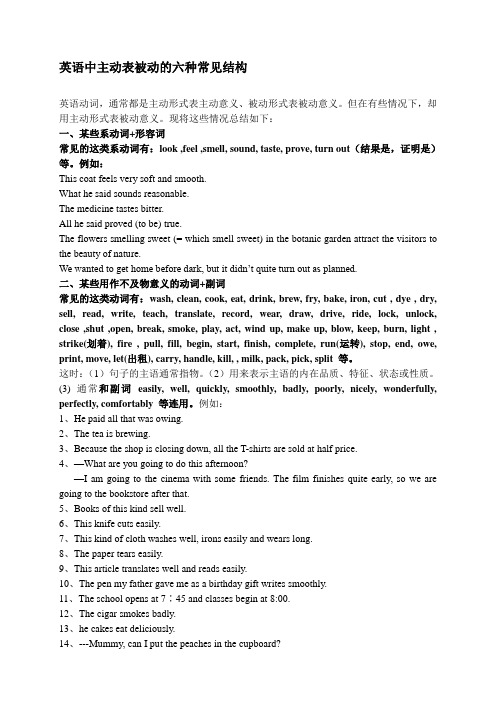
英语中主动表被动的六种常见结构英语动词,通常都是主动形式表主动意义、被动形式表被动意义。
但在有些情况下,却用主动形式表被动意义。
现将这些情况总结如下:一、某些系动词+形容词常见的这类系动词有:look ,feel ,smell, sound, taste, prove, turn out(结果是,证明是)等。
例如:This coat feels very soft and smooth.What he said sounds reasonable.The medicine tastes bitter.All he said proved (to be) true.The flowers smelling sweet (= which smell sweet) in the botanic garden attract the visitors to the beauty of nature.We wanted to get home before dark, but it didn’t quite turn out as planned.二、某些用作不及物意义的动词+副词常见的这类动词有:wash, clean, cook, eat, drink, brew, fry, bake, iron, cut , dye , dry, sell, read, write, teach, translate, record, wear, draw, drive, ride, lock, unlock, close ,shut ,open, break, smoke, play, act, wind up, make up, blow, keep, burn, light , strike(划着), fire , pull, fill, begin, start, finish, complete, run(运转), stop, end, owe, print, move, let(出租), carry, handle, kill, , milk, pack, pick, split 等。
英语主动表被动用法归纳
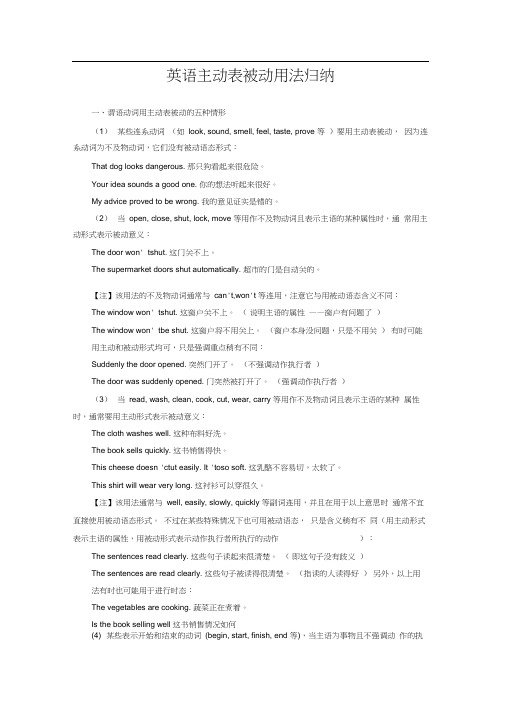
英语主动表被动用法归纳一、谓语动词用主动表被动的五种情形(1)某些连系动词(如look, sound, smell, feel, taste, prove 等)要用主动表被动,因为连系动词为不及物动词,它们没有被动语态形式:That dog looks dangerous. 那只狗看起来很危险。
Your idea sounds a good one. 你的想法听起来很好。
My advice proved to be wrong. 我的意见证实是错的。
(2)当open, close, shut, lock, move 等用作不及物动词且表示主语的某种属性时,通常用主动形式表示被动意义:The door won' tshut. 这门关不上。
The supermarket doors shut automatically. 超市的门是自动关的。
【注】该用法的不及物动词通常与can't,won't 等连用,注意它与用被动语态含义不同:The window won' tshut. 这窗户关不上。
(说明主语的属性——窗户有问题了)The window won' tbe shut. 这窗户将不用关上。
(窗户本身没问题,只是不用关)有时可能用主动和被动形式均可,只是强调重点稍有不同:Suddenly the door opened. 突然门开了。
(不强调动作执行者)The door was suddenly opened. 门突然被打开了。
(强调动作执行者)(3)当read, wash, clean, cook, cut, wear, carry 等用作不及物动词且表示主语的某种属性时,通常要用主动形式表示被动意义:The cloth washes well. 这种布料好洗。
The book sells quickly. 这书销售得快。
This cheese doesn 'ctut easily. It 'toso soft. 这乳酪不容易切,太软了。
高考英语中主动表被动现象

We are all concerned about his health.
Exercises: choose the best choice.
1. There are many good films played by ChengLong that are worth _____. C A. to be seen B. being seen C. seeing D. to see
二、主动形式表被动含义:
一)、不及物动词的过去分词只表完成不表被动,因此 在be + p.p. 的句型中看似被动实际是主动。 例如: be gone The days are gone when China was both poor and backward. 二)、很多时候过去分词都变成了形容词, 因此也是看 似被动实际表主动, 尤其是后边加介词更为多见。 例如: be interested (in…) 类似的动词有:be surprised, be excited, be pleased, be satisfied, be disappointed, be shocked, be moved, be amazed, be frightened, be delighted, be ashamed 等。
He has a family to support. 他要维持一个家庭。 (与family有动宾关系,与he有的形容词时,结构: 主语+系动词+形容词 + 不定式; 动词+宾语+形容词+不 定式。如果形容词是表示难易、利弊等含义,如 difficult, easy, comfortable, convenient, hard, cheap, expensive等,不定式用主动表被动。 The question is difficult to answer. 这个问题很难回答。 The work is easy to do. 这项工作很好做。 I found the car comfortable to ride in. 我觉得这种车很好坐。 That makes poetry difficult to write. 那就使得诗很难写。
英语中主动表被动情况小结

【注】如果不定式的逻辑主语不是句子 的主语,则应用被动式,比较: I have something to type. 我有些东西要打(字)。(指自己打字) I have something to be typed. 我有些东西要打(字)。(指请人打字)
(4) 不定式用于with复合结构时,主动表被动 例:With a lot of work to do , he will be busy all day.
With many things to buy, he went to the supermarket.
(5)be worth后的动名词要用主动表被动。 如: In all, the book is worth reading. 总之,这本书值得一读。 This might be worth thinking about. 这可能值得考虑。 【注】与worth相似的worthy却不一样,其后 不接动名词而接不定式(若接动名词则其前应 有介词of),且要用被动式表示被动含义。如: This book is worthy to be read [of being read]. 这本书值得一读。
【注】这类表达中的名词前通常没有冠词,且该名词一般都
具有动作意义。如 ,under attack,under discussion, under examination,under repair(在修缮中) in sight(看得见),in (good) repair(维修良好的),in store(贮藏 着)on sale on trial(在试用),on display(在展出),on show(在 展出),on exhibition(在展出)等。
二、非谓语动词用主动表被动的几种情形 (1) 不定式to blame, to let, to seek用作表语时, 通常要用主动形式表示被动意义: Who is to blame? 该怪谁呢? He shouldn’t be to blame for the accident. 他不该为此次事故负责。
高考英语中主动表被动现象

生多么重要。同学交往需要坦诚相待;亲友交往需要关怀备至;陌生人交往需要诚信,但也不能全无戒备之心。交往之道,虽说有共同的社会规范,但也因人、因事、因时而异,所以,作者尽可以根据自己的人生经历或体会来扣题为文,只有真实的表达才有至善至美之文。 作文题三十
七 阅读下面的材料,根据要求作文。 有位书法家对一位用废报纸练字的人说:“如果你用最好的纸来写,你可能会写得更好。”那人很奇怪地问原因,书法家笑而不答,只写了一个“逼”字,那人顿悟,这是让他惜纸逼自己写好字。 还有这样一则谚语:“如果你想翻墙,请
Your hair wants/needs cutting (needs to be cut).
2、不定式作定语,放在被修饰词后面,与前面被修饰 的名词或代词有动宾关系,又在句子中与另一名词或 代词有主谓关系,不定式要用主动表被动含义。
I have much work to do. 我有许多要做的事情。
The question is difficult to answer. 这个问题很难回答。
The work is easy to do. 这项工作很好做。
I found the car comfortable to ride in. 我觉得这种车很好坐。
That makes poetry difficult to write. 那就使得诗很难写。
也需要一定的“分析问题”作为“解决问题”的前提和条件。“以一位高中学生的身份”是作文时需要注意的重要信息。 ? 作文题三十一 ? 阅读下面的材料,根据要求作文。 “我有一个梦”是上世纪评出的全世界最有名的十句名言的第一句,它是马丁·路德·金在演讲中提到的,
他的演讲现在也成为世界有名的演讲之一。 “我有一个梦”为什么成为世界名言? 200年前的康德有一句话:人的本性就在于知其不可为而为之。如果没有这个本性,人与动物就没有什么区分了。人的创造性就在于,通过自己的不懈追求去实现那些原先被认为不可能甚至于不
英语主动表被动用法归纳
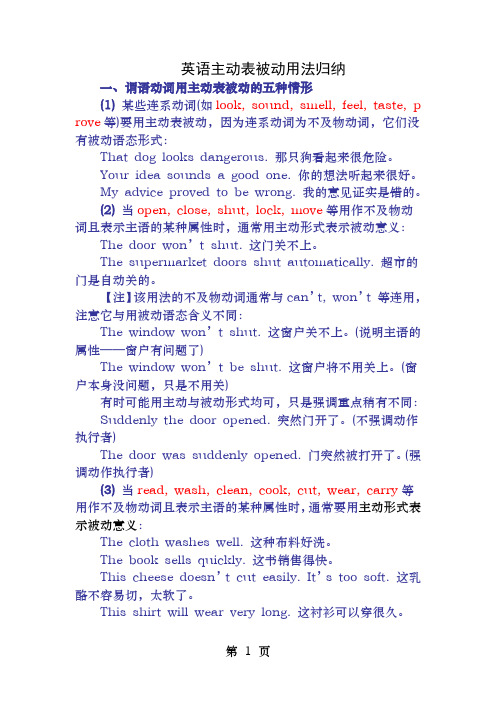
英语主动表被动用法归纳一、谓语动词用主动表被动的五种情形(1)某些连系动词(如look, sound, smell, feel, taste, p rove等)要用主动表被动,因为连系动词为不及物动词,它们没有被动语态形式:That dog looks dangerous. 那只狗看起来很危险。
Your idea sounds a good one. 你的想法听起来很好。
My advice proved to be wrong. 我的意见证实是错的。
(2)当open, close, shut, lock, move等用作不及物动词且表示主语的某种属性时,通常用主动形式表示被动意义:The door won’t shut. 这门关不上。
The supermarket doors shut automatically. 超市的门是自动关的。
【注】该用法的不及物动词通常与can’t, won’t 等连用,注意它与用被动语态含义不同:The window won’t shut. 这窗户关不上。
(说明主语的属性——窗户有问题了)The window won’t be shut. 这窗户将不用关上。
(窗户本身没问题,只是不用关)有时可能用主动与被动形式均可,只是强调重点稍有不同:Suddenly the door opened. 突然门开了。
(不强调动作执行者)The door was suddenly opened. 门突然被打开了。
(强调动作执行者)(3)当read, wash, clean, cook, cut, wear, carry等用作不及物动词且表示主语的某种属性时,通常要用主动形式表示被动意义:The cloth washes well. 这种布料好洗。
The book sells quickly. 这书销售得快。
This cheese doesn’t cut easily. It’s too soft. 这乳酪不容易切,太软了。
英语中主动表被动的六种常见结构

英语中主动表被动的六种常见结构英语动词,通常都是主动形式表主动意义、被动形式表被动意义.但在有些情况下,却用主动形式表被动意义.现将这些情况总结如下:一、某些系动词+形容词常见的这类系动词有:look ,feel ,smell, sound,taste, prove, turn out(结果是,证明是)等.例如:This coat feels very soft and smooth.What he said sounds reasonable。
The medicine tastes bitter。
All he said proved (to be)true。
The flowers smelling sweet (= which smell sweet) in the botanic garden attract the visitors to the beauty of nature。
We wanted to get home before dark,but it didn’t quite turn out as planned.二、某些用作不及物意义的动词+副词常见的这类动词有:wash,clean, cook, eat,drink, brew, fry,bake,iron, cut ,dye , dry, sell,read,write, teach,translate,record, wear,draw,drive,ride,lock, unlock, close ,shut ,open,break,smoke, play,act, wind up, make up, blow, keep, burn,light , strike(划着),fire , pull,fill, begin,start,finish, complete, run(运转), stop,end, owe, print,move,let(出租),carry, handle, kill,, milk, pack,pick,split 等。
主动表被动的13种情况

一、不及物动词与状语连用,用以表示主语的品质和状态常见动词是:cut, sell, read,write, fill, cook, lock, wash, drive, keep等。
1This knife cuts well.这把刀好切。
2These books sell well.这些书好卖。
3The pen writes smoothly.这支笔写起来流畅。
4Meat won’t keep long in such hot weather.肉在这样热的天气里放不长久。
5The cloth washes well.这种布好洗。
二、一些连系动词的主动式+形容词。
常见动look,smell,taste,sound,feel,prove,turn out等。
6The apples taste good.7The flower smells wonderful.8The news proved/turned out true.9Cotton feels soft.三、不定式在某些形容词之后,且与主语有动宾关系。
不定式修饰作表语和宾语补足语的形容词时,结构:主语+系动词+形容词 + 不定式;动词+宾语+形容词+不定式。
如果形容词是表示难易、利弊等含义:用于此结构的常见形容词有:hard,defficult,easy,heavy,fit,good,comfortabl e,convenient,impossible,convenient, cheap, expensive,(便利的,方便的), 等。
10The problem is easy to do.11The question is difficult to answer.12The box is heavy to carry.13The project is impossible to complete in a year.14The question is difficult to answer.这个问题很难回答。
- 1、下载文档前请自行甄别文档内容的完整性,平台不提供额外的编辑、内容补充、找答案等附加服务。
- 2、"仅部分预览"的文档,不可在线预览部分如存在完整性等问题,可反馈申请退款(可完整预览的文档不适用该条件!)。
- 3、如文档侵犯您的权益,请联系客服反馈,我们会尽快为您处理(人工客服工作时间:9:00-18:30)。
英语中主动表被动的六种常见结构英语动词,通常都是主动形式表主动意义、被动形式表被动意义。
但在有些情况下,却用主动形式表被动意义。
现将这些情况总结如下:一、某些系动词+形容词常见的这类系动词有:look ,feel ,smell, sound, taste, prove, turn out(结果是,证明是)等。
例如:This coat feels very soft and smooth.What he said sounds reasonable.The medicine tastes bitter.All he said proved (to be) true.The flowers smelling sweet (= which smell sweet) in the botanic garden attract the visitors to the beauty of nature.We wanted to get home before dark, but it didn’t quite turn out as planned.二、某些用作不及物意义的动词+副词常见的这类动词有:wash, clean, cook, eat, drink, brew, fry, bake, iron, cut , dye , dry, sell, read, write, teach, translate, record, wear, draw, drive, ride, lock, unlock, close ,shut ,open, break, smoke, play, act, wind up, make up, blow, keep, burn, light , strike(划着), fire , pull, fill, begin, start, finish, complete, run(运转), stop, end, owe, print, move, let(出租), carry, handle, kill, , milk, pack, pick, split 等。
这时:(1)句子的主语通常指物。
(2)用来表示主语的内在品质、特征、状态或性质。
(3) 通常和副词easily, well, quickly, smoothly, badly, poorly, nicely, wonderfully, perfectly, comfortably 等连用。
例如:1、He paid all that was owing.2、The tea is brewing.3、Because the shop is closing down, all the T-shirts are sold at half price.4、—What are you going to do this afternoon?—I am going to the cinema with some friends. The film finishes quite early, so we are going to the bookstore after that.5、Books of this kind sell well.6、This knife cuts easily.7、This kind of cloth washes well, irons easily and wears long.8、The paper tears easily.9、This article translates well and reads easily.10、The pen my father gave me as a birthday gift writes smoothly.11、The school opens at 7∶45 and classes begin at 8:00.12、The cigar smokes badly.13、he cakes eat deliciously.14、---Mummy, can I put the peaches in the cupboard?---No, dear. They don’t keep well. Put them in the fridge instead.15、His voice doesn't carry well.16、This material does not dye well but dries quickly.17、The damp match won't strike.注意:在这里动词都是当作不及物动词使用,用主动形式表被动强调的是主语本身所具有的某种内在的品质,促进、妨碍或阻止动词表示动作的实现;如果用被动语态则强调外界作用造成的影响,动词表示的动作的实现与否和主语的品质无关,主要取决于动作的执行者。
试比较:This novel doesn’t sell well. 这本小说销售不畅。
(是小说本身的原因)These novels have not been sold. 这些小说没有销出去。
(由于其它原因没有卖出去,与小说本身无关)The door won’t lock.门锁不上。
(门本身有毛病)The door wasn’t locked.门没锁。
(人没把门锁上,与门本身无关)The text teaches well. 这篇课文好教。
(由于课文本身的内容才使得这课文“好教” )The text is not taught well. 这篇课文没有教好。
(与课文本身无关,问题是动作执行者没有把课文教好。
三、某些不及物动词(短语)常见的这类动词有:happen, occur, take place, belong to ,break out, last, run out ,go out(熄灭), go down(下降),cost, spread,come(传来),come on(开始), come out(出版), come up(出现), come into being(产生), come to one’s mind(想起), come about(发生), come true, give out, suit, fit, add up(to),catch fire, measure, weigh等1、The war broke out in 1938 and lasted eight years.2、The big house belongs to me.3、The first textbooks written for teaching English as a foreign language came out in the 18th century.4、The bridge measures 30 meters across.5、The news came that our team had won the game.6、A terrible accident happened last night.7、The price has gone down,but I doubt whether it will remain so.8、The evening news comes on a t seven o’clock and lasts only thirty minutes.四、某些介词+名词常见的介词有:under, beyond, in, on, for, out of等。
(1) “under +名词”结构, 表示某事“在进行中”。
例如:The whole matter is under discussion (=is being discussed).He is said to be under arrest for stealing.The house under repair is our classroom building.类似的结构还有:under construction (在建造中),under treatment(在治疗中), under question(在审讯中),under attack(在进攻中),under consideration(在考虑中),under contact(在联系中),under examination(在审查中),under investigation(在调查中),under review(在审议中),under trial(在受审中),under control(在被控制中)等。
(2) “beyond +名词”结构,表示“超出(胜过)……范围、限度”。
例如:The news is beyond belief(= The news can’t be believed).类似的结构还有beyond one’s reach(鞭长莫及),beyond one’s control(无法控制),beyond one’s understanding(无法理解),beyond one’s expectation(始料不及), beyond one’s power(力所不能及)等。
(3) “on +名词”结构, 表示“在从事…… 中”。
例如:Today some treasures are on show in the museum (= are being showed).常见的还有:on sale(出售),on show(展出), on trial(受审)等。
(4) “out of +名词”结构,表示“超出…… 之外”,例如:The plane was out of control (can’t be cont rolled).。
常见的有:out of sight(超出视线之外),out of one’s reach(够不着), out of fashion(过时),out of question(毫无疑问)等。
(5) “for+名词”结构,表示“适于……,有待于……”。
例如:That house is for sale. (= That house is to be sold).The shop is for rent.(6) “in +名词”结构,表示“在……过程中或范围内”例如:The book is not yet in print.(=is not yet printed)The house is in sight now.5、动词不定式(1) 主语+及物动词+宾语+ to do(作定语)。
